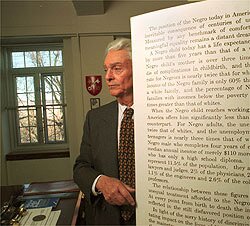 |
 |
 |
|
|
|||||||||||||
|
|
|||||||||||||
| Email Article | Printable Page |
50 Years Later, Howard Law School Remembers Brown v. Board
Fifty years ago this May 17, the Supreme Court ruled in the five cases known as Brown v. Board of Education that "in the field of public education the doctrine of 'separate but equal' has no place." That set in motion the end of the officially sanctioned segregation that had existed since the end of the Civil War.
 |
|
Photo credit: www.law.howard.edu/
Julian R. Dugas, shown in this file photo, worked on the companion D.C. desegregation case.
|
The Howard University School of Law presented a panel of lawyers who worked on the case. Including in the Jan. 21 discussion, "The Lawyers Who Defeated 'Separate But Equal'," were Robert L. Carter, Julian R. Dugas, Oliver W. Hill Sr. and Louis H. Pollak, who all played significant roles in the Brown victory.
Hill remembered the time he spent at the Law School with classmate Thurgood Marshall, who as director-counsel of the NAACP Legal Defense and Educational Fund, Inc., argued the case against segregated schools before the court.
"It was a wonderful time to have been there," said the legendary civil rights lawyer, born in 1907. Recalling that the 1896 Plessy v. Ferguson decision upholding "separate but equal" facilities was still the law of the land, Hill said, "Plessy made us not even second- or third-class citizens, but sometimes it pushed us to fourth-class citizens."
|
Resources
Chronology of Brown case |
Being at Howard at that time caused Hill to question what part he could play to help improve the state of blacks in America, he said. He recalled what Charles Hamilton Houston told him about the civic responsibility of lawyers: "Any lawyer who is not a social engineer is a parasite to society."
Dugas, a professor at the School of Law, recalled that when he attended the school, students would go to the "sub-basement" of Founders' Library, where the Law School was housed, to practice dry runs of their cases. Dugas worked on the companion D.C. school desegregation case, Bolling v. Sharpe.
Carter, who also delivered oral argument in the Brown case, said he believed that being able to take part in one of the most important events in American history gave him the opportunity to show America the deep impact racism made on blacks.
"It was an honor and a privilege to achieve Houston's objectives to secure entry of blacks into all graduate schools and colleges," said Carter, who is now a U.S. District Court judge in New York.
Citing the "doll" test, in which young black children identified positive characteristics with white dolls and negative characteristics with black ones, Carter offered the courts a view of how black minds developed in a racist society.
He encouraged the next generation of leaders to take a stand in their communities. "Do not just do your best, but do something that is worth it. It will make the community better dthan when we found it and after we leave and pass on," he said.
Pollak, now a U.S. District Court judge in Pennsylvania, said he viewed the opportunity to work with such legal giants as Marshall and Houston as a way to reveal to the rest of America the effects of segregation. "I jumped at the chance to work with great figures and show that racial segregation in schools is damaging to black children," he said.
Third-year law student Alina Hadi said she understood her predecessors' significance. "It is important to know what they went through to reach desegregation," she said. "It is amazing to be in the presence of these people, and we should all be thankful" for them.
Third-year law student Melinda Scott agreed. "It is inspiring to see who put the building blocks in place and allowed us to be here today," she explained. "We would not be able to entertain the dream to work in big firms, in international law and have stature in the government, and we certainly would not have diversity in our class."
Nytaino Romulus, a first-year law student, stressed the importance of continuing the legacy. "They are a source of inspiration because they championed the movement. Instead of being complacent with the issues today, drastic revolutionary change can still be achieved," he said.
Posted Jan. 27, 2004
In News
Hip-Hop Generation Debated at "State of Black Union" Conference
Student Journalists Gear Up for HBCU Newspaper Conference
| Home | News | Sports | Culture | Voices | Images | Projects | About Us Copyright © 2007 Black College Wire. Black College Wire is a project of the Black College Communication Association and has partnerships with The National Association of Black Journalists and the Robert C. Maynard Institute for Journalism Education. |